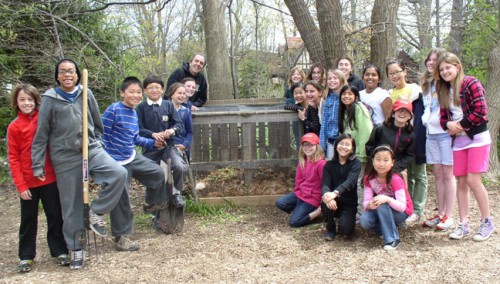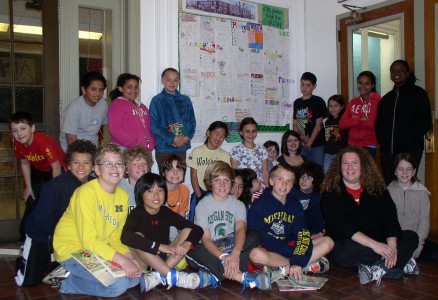District focuses on sustainability
 What: An Ann Arbor Public Schools program called EASE: Environmental Awareness and Sustainability Education began this school year. The four-year program is designed to audit energy use in all buildings and decrease district energy expenditures by $324,000 per year.
What: An Ann Arbor Public Schools program called EASE: Environmental Awareness and Sustainability Education began this school year. The four-year program is designed to audit energy use in all buildings and decrease district energy expenditures by $324,000 per year.
Details: The EASE website is: www.a2schools.org/ease. There is also a hot link to the site at the bottom of the district homepage www.a2schools.org. Visit to view information about each school, energy audits done last fall and ongoing information about sustainability efforts.
•••••••••••••••••••••••••••••••••••••••••••••••••••••••••••••••••••••••••••••••••••••••••••••••••••••••••••
From AAPSNews Service
Related story: Lawton Elementary cleans up, recycles their lunchroom

Fifth-graders in Tom Yaeger’s Ecology Club at Angell Elementary are aiming to lessen their carbon footprint.
The 23 club members have the right idea: They’re finding ways to encourage sustainability, recycling and using fewer resources and spreading the word throughout their elementary school community.
It is one of many grass-roots sustainability programs going on in and around the Ann Arbor Public Schools. Although individual teachers create their own programs, they all tie nicely into a districtwide initiative: the EASE initiative – Environmental Awareness and Sustainability Education, which began this year.
EASE conducted audits of all buildings in the fall and offers ongoing information about sustainability efforts by individual school (www.a2schools.org/EASE.)
At Angell, the Ecology Club meets each Wednesday, members giving up their recess time to meet and about energy saving ideas, recycle used milk cartons from around the school and take cafeteria vegetable clippings out to a newly created compost pile.
“It starts training the whole school – It’s pretty cool,” said fifth-grade teacher Tom Yaeger, who has taught at Angell for 23 years and organized the club four years ago. About half of fifth-graders take part in the volunteer effort and Yaeger said most members come weekly. “A big part is empowering kids to know they can do something about it. That small steps do matter. It’s a powerful feeling they get.”
Students call it the “EcoClub” and this year, they have tackled three independent projects: Food improvement, energy and recycling/composting, which started this year. “They fill a 96-gallon (recycling) cart,” Yaeger said. “It fills up in four days, they do so much recycling.”
EcoClub member Tony explained about an energy contest held at the school this year. They made presentations to each classroom about energy consumption and where we get our energy. “We tried to teach the kids in the school to save energy,” he explained. After two weeks of the “Lights Out” campaign, the first-graders won. Winners got “reward bags:” recycled notebooks they made from reused paper and decorated covers in a padding press, and recycled pencils.
Addy is on the Food Improvement Committee. She explained that members did a silent survey in the cafeteria, seeing what types of foods students were selecting and what was thrown away. “Our goal is to have 50 percent of the kids make healthy choices,” she said.
Angell fifth-graders got involved with the club for a variety of reasons, from following the lead of friends and thinking it sounded like fun, to taking environmental issues seriously. “I’ve always been really interested in helping the environment,” Zoe said. “That’s why I joined the energy group.”
Teacher’s passion for sustainability transfers to students
At Burns Park Elementary, fifth-grade science teacher Sandy Kreger is passionate about the environment – so much so that she spent two years putting a green addition on her home.

She took a “green” high school unit she got at a workshop and modified it for her elementary students. The Burns Park fifth-graders learned where things are made, what is green and what they can do to be green. They took part in a life-size timeline of biodegradability of all types of items, learned about recycling and composting and did a poster project using old recycled sheets and natural materials – such as ketchup, mustard and berries – as paints.
They took green pledges as part of the process. “This year, I thought it would be really nice for them to take some responsibility,” Kreger said of the pledges. “This is a way they can make a difference.”
“It was wonderful – I could teach it all year,” she said of the unit, which enhanced the students’ regular, required lessons. “Students felt like they had a voice – like they could do something about it. I try to concentrate on things they can really help to change.”
Kreger uses the Be Green retail store for materials – and used many items from the store when she did her own home-improvement project. During her project, she considered what she could do to involve students. She had a green builder come into her classroom and, when her project was completed, she invited her students and their families to her home at Halloween to see the addition.
“The biggest lesson I’ve learned is how I still have things to learn,” she noted. “I’m still learning how to reuse people’s stuff.”

